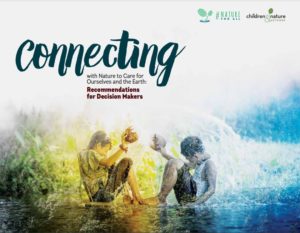Connecting with Nature
 The benefits of connecting with nature start with our children. For example, infants and toddlers develop healthy, resilient bodies from time spent exploring hands-on and whole-body with natural materials. They are stimulated cognitively and physically by the sights and sounds in outdoor spaces. They develop social skills and bond with family members through shared experiences in the outdoors.
The benefits of connecting with nature start with our children. For example, infants and toddlers develop healthy, resilient bodies from time spent exploring hands-on and whole-body with natural materials. They are stimulated cognitively and physically by the sights and sounds in outdoor spaces. They develop social skills and bond with family members through shared experiences in the outdoors.
Outdoor play in school-aged children has been linked to the development of core skills, including problem-solving and reasoning, creativity, curiosity, risk-identification, self-regulation and social and emotional learning. For students, studies are showing positive associations between the greenness of school landscapes and academic performance, such as standardised test scores and rates of graduation. A recent survey conducted in 45 countries for the Outdoor Classroom Day initiative revealed that when lessons are taken outdoors, children are more engaged in learning (88%), are better able to concentrate (68%), and are better behaved (65%).
Children and adolescents with access to nature also tend to enjoy more physical activity. They benefit from reduced rates of obesity and other chronic diseases, including diabetes and heart disease, as well as enhanced emotional well-being and resilience. Research indicates that exposure to nature can act as a protective factor for the mental health of young people. A recent study of 29,784 Canadian adolescents found that engagement in outdoor play—even as little as a half hour per week—was associated with decreased prevalence of psychological symptoms in females, and decreased prevalence of psychosomatic symptoms in both males and females. Teens also benefit from peer support and grow in self-esteem while working, learning, and exploring in groups—particularly enriched by service-oriented projects in the outdoors—that develop their confidence and capacity to care for themselves, others and the environment.
Read full report here





